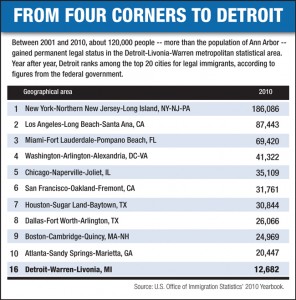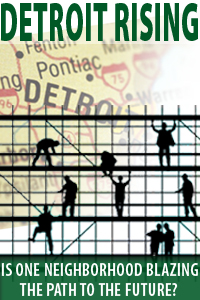Plan for Detroit: Immigrants bring money
Former state Rep. Steve Tobocman argues immigration is the key to repopulating and reviving Detroit. Now director of Global Detroit, Tobocman recently wrote The Global Detroit Study, which outlines a plan to help Michigan regain economic prosperity by encouraging more immigrants to move here.
Bridge Magazine's Jo Mathis caught up with the voluble Tobocman recently to talk about the global strategy and how to revive Detroit and Michigan.
Bridge: If there aren’t enough jobs now for current Michiganians, how will the immigrants you hope to attract here find work?
A: Immigrants create jobs; they don’t take jobs. That’s the core message in a clear, documented, factual reality chronicled in the Global Detroit Study.
The study looked at the impact that immigrants and international connections have on the region. Even those of us who had an open ear and positive outlook were shocked at just how important and impactful and powerful immigrants and the international community have been to the region.
Much of the shining spots of the Michigan economy, and much of the growth industries, have been pioneered and injected with capital from the international community and from new residents.
Immigrants are 6 percent of the overall population, producing 32.8 percent of the high-tech start-ups. From 1995 to 2005, immigrants were three times as likely as non-immigrants in Michigan to start a business. Immigrants were more than six times as likely to start a high-tech firm in Michigan between 1995 and 2005.
We tend to attract a very educated population to our region, particularly in the kinds of fields that drive the new economy -- in the science, technology, engineering, mathematics and entrepreneurial. This is probably because of our automotive heritage and the quality and caliber of research universities in this state.
Bridge: When did you first develop your views on immigration?
A: I’ve long had positive views about the opportunities for our region regarding immigration because for the past 17 years, I’ve done a lot of my work in Southwest Detroit, which is the only growing region in the city. It’s one of the few revitalizing regions in the city of Detroit, and critical to that has been the strength of immigrants.
Bridge: So what is it Michigan needs to do?
A: We’ve identified four strategies we believe are the key to regional prosperity and economic growth:
1. Be more welcoming. The more welcoming we are, the more we will succeed by attracting all kinds of international talent that creates jobs and economic growth for non-immigrants in the region.
2. Go after foreign-directed investments, particularly those that create jobs in the region. We highlight a number of opportunities around what are called EB5 regional VISA (which allows foreigners to get green card status by investing $500,000 or $1 million in a job-generating endeavor that creates 10 U.S. jobs), the investor VISA, as well as the strategy of nearshoring, which is attracting global companies to hire international workers utilizing Canada’s more liberal immigration laws and partnering that work force with American workers in the Detroit area.
3. Try to retain international talent, particularly that of international students coming to this state.
4. Capitalize on the historic role that immigrants and ethnic groups have on revitalizing and stabilizing urban neighborhoods. We are a region in Southeast Michigan where our central cities are struggling. Detroit and its suburbs face significant challenges. Economic developers in Auburn Hills are trying to attract all kinds of investors, but when the poster child of the region is on the cover of Time magazine as a struggling, decaying city of urban poverty and blight, that impacts regional competitiveness.
Bridge : How would increased immigration affect our export trade?
A: We believe that as we have more international residents in the state, we will also be able to have better relationships for exports, and we’ll grow our export economy. We’ll also be able to attract international investments in new companies. Whether it’s the 300 working class jobs that Hyundai Motors brings to the city of Detroit, or the high-tech A123 Systems (an immigrant started business), not to mention the potential automotive assembly jobs that might save for our region by pioneering the lithium ion battery for automotive use.
A123 Systems tells the story that we think is critical for our state to realize, which is that A123 Systems is a battery company that currently manufactures the batteries for Black & Decker Power Tools. They’ve received close to a billion dollars of federal energy incentives and have relocated their efforts around car batteries that will power the electric cars. They’ve relocated that (research and development) to Michigan.
Bridge: What effect would increased immigration have on housing in Michigan?
A: For states losing population, new population can help sustain housing values and create growth. In this country, population stabilization is almost a one-to-one correlation, and I would say causation, with immigration. You don’t usually see regions of this country growing without immigration, particularly in the Northeast/Midwest urban areas.
In terms of urban neighborhood stabilization, we’re thinking of a variety of strategies that really create welcoming communities within those urban neighborhoods that attract and retain ethnic and international populations. We’re looking at what may be some opportunities around refugees. In the Detroit region, we’ve been lucky to get several thousands refugees for each of the last few years where we’re settling 2,500 to 3,500 Iraqi refugees a year in the region. But the vast majority of those refugees are settling in the suburbs, and we think we can create some exciting partnerships that very affordable housing development, housing sustainability and urban revitalization with some of those refugee resettlement programs to direct some of that growth back into the cities.
Bridge: Which Michigan cities would most benefit from immigration here?
 A: From a statewide, land-use prospective, obviously the central cities -- Detroit and the inner ring suburbs -- are critical. And redirecting growth there is important, as opposed to expanding the size of the metropolitan region and the exurbs.
A: From a statewide, land-use prospective, obviously the central cities -- Detroit and the inner ring suburbs -- are critical. And redirecting growth there is important, as opposed to expanding the size of the metropolitan region and the exurbs.
One of the initiatives we have fully launched is called Welcoming Michigan. We became the 13th state in the country to have a localized Welcoming America campaign. We target areas of transition where a large number of immigrants are moving. We could have targeted Plymouth-Canton, which has transformed in my lifetime from an area that was probably 95 percent or more white to an area that’s a quarter Asian now. But we’re targeting the Chadsey-Condon neighborhood inDetroit, Hamtramck and Sterling Heights, which are all neighborhoods in transition.
We’ll be working in those communities to identify the impacts the new populations are having, and to address concerns of not just the immigrants, but the non-immigrants, and the experiences they’re having with the changing demographics of their communities, and how to make it work to make sure those communities are successful.
Bridge: Are we fully taking advantage of our proximity to Canada?
A: We think Detroit/Windsor can be a pioneer in a kind of collaboration/co-location for international companies looking for talent that want to be in the North American marketplace that don't want to deal with time zones and language breakdowns and business cultures and legal cultures that are significantly different.
We want them to look at the North American opportunity between Canada and the United States, where Canada's liberal immigration laws will allow international talent to be housed in Canada, and U.S.workers can be housed in the U.S. ... We have some funding from the New Economy Initiative for Southeast Michigan ... as well as support from all the southeast Michigan economic development players. We've issued a request for proposals, and have gotten seven proposals to really dig down deep into this opportunity and develop what are the industries, firms and the job creation potential for Detroit-Windsor to develop a full-blown near-shoring recruitment strategy.
Bridge: Bottom line, what is it you want to accomplish through Global Detroit?
A: We’re trying to transform the view of the region and state from where folks are fighting over a limited number of jobs. It’s about how do we expand the pie? How do we grow the economy? And how do we make sure that Michigan and Southeast Michigan are the most prosperous states on the globe?
We think that being welcoming to international talent, immigrants and investment and entrepreneurship are the way to do that. It’s something that was at the core of what we did a century ago in the auto industry. We think that with the support of Gov. Rick Snyder in the Global Michigan Initiative, with some of the partners we’ve been able to put together around Global Detroit, that Southeast Michigan and Michigan are on a path right now to be real pioneers and one of the most welcoming regions and states on the planet.
Those kinds of foundational elements of being welcoming and working hard to ensure ur area integrates talent, opportunity and prosperity among all people into the region create a foundation for us to have the next Henry Ford in whatever industry that may be.
Business Watch
Covering the intersection of business and policy, and informing Michigan employers and workers on the long road back from coronavirus.
- About Business Watch
- Subscribe
- Share tips and questions with Bridge Business Editor Paula Gardner
Thanks to our Business Watch sponsors.
Support Bridge's nonprofit civic journalism. Donate today.
See what new members are saying about why they donated to Bridge Michigan:
- “In order for this information to be accurate and unbiased it must be underwritten by its readers, not by special interests.” - Larry S.
- “Not many other media sources report on the topics Bridge does.” - Susan B.
- “Your journalism is outstanding and rare these days.” - Mark S.
If you want to ensure the future of nonpartisan, nonprofit Michigan journalism, please become a member today. You, too, will be asked why you donated and maybe we'll feature your quote next time!



